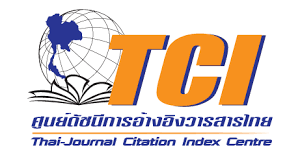การจัดการความรู้และการเสริมอำนาจพนักงาน กรณีศึกษา บริษัท มาเยคาว่า(ประเทศไทย) จำกัด
คำสำคัญ:
การเสริมอำนาจพนักงาน, การจัดการความรู้, การเข้าถึงอำนาจ, การได้รับโอกาสบทคัดย่อ
การวิจัยครั้งนี้มีวัตถุประสงค์ (1) เพื่อศึกษาระดับการเสริมสร้างอำนาจของพนักงาน บริษัท มาเยคาว่า (ประเทศไทย) จำกัด (2) เพื่อศึกษาระดับการจัดการความรู้ในบริษัทมาเยคาว่า (ประเทศไทย) จำกัด และ (3) เพื่อศึกษาความสัมพันธ์ระหว่างการจัดการความรู้และการเสริมอำนาจ กลุ่มตัวอย่างที่ใช้ในการวิจัย คือ พนักงานบริษัท มาเยคาว่า (ประเทศไทย) จำกัด จำนวน 104 คน ที่ได้จากการสุ่มอย่างง่าย เครื่องมือที่ใช้ในการวิจัย คือแบบสอบถามที่มีค่าความเชื่อมั่น 0.968 สถิติที่ใช้วิเคราะห์ ได้แก่ ร้อยละ ค่าเฉลี่ยเลขคณิต ส่วนเบี่ยงเบนมาตรฐาน และใช้การวิเคราะห์สัมประสิทธิ์สหสัมพันธ์แบบเพียร์สันในการทดสอบสมมติฐาน
ผลการวิจัยพบว่า (1) ระดับการเสริมสร้างอำนาจของพนักงานบริษัท มาเยคาว่า (ประเทศไทย) จำกัด โดยรวมอยู่ในระดับสูง (2) ระดับการจัดการความรู้ใน บริษัท มาเยคาว่า (ประเทศไทย) จำกัด โดยรวมอยู่ในระดับสูง (3) การจัดการความรู้มีความสัมพันธ์กับการเสริมอำนาจพนักงานในเชิงบวกในระดับสูง อย่างมีนัยสำคัญทางสถิติที่ระดับนัยสำคัญ 0.01 ผลการวิจัยนี้สามารถนำไปใช้ในการไปวางแผนเสริมสร้างพลังอำนาจและการจัดการความรู้ให้กับพนักงานในบริษัท เพื่อส่งเสริมบุคลากรในบริษัทให้มีความรู้ความสามารถที่ทันต่อยุคสมัยรวมทั้งยังส่งเสริมความเจริญในหน้าที่การงานอีกด้วย






